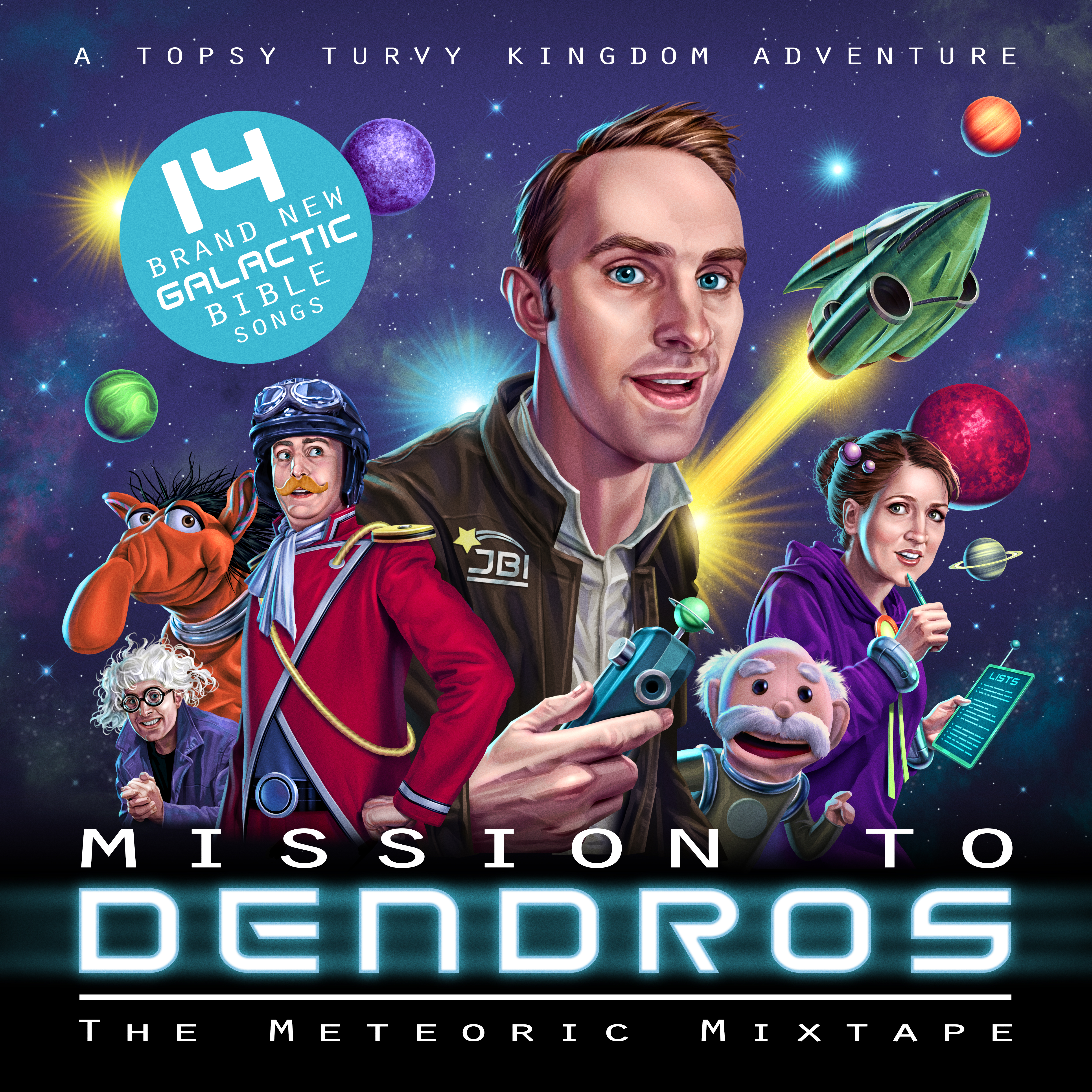September 5, 2019
Songs Stick and Songs Speak: Discipling Kids With Gospel Singing

Michael Tinker is a friend of mine from Sheffield in the UK. He is a singer/songwriter who specialises in creating content and productions for discipling children. (He’s a great folk musician too). Michael possesses a range of musical styles and personas in his children’s performances and appears at schools and church groups across the UK. Think of him as the UK’s Colin Buchanan. Here’s his website michaeljtinker.com.
In this guest post Michael explains the thinking behind writing songs that don’t just teach across the Bible story (numerous examples abound), but also down into specific biblical doctrines such as perseverance and soteriology. Michael explained to me how this approach has been helpful in his own discipling of his children.
Our eldest is 10 years old and worrying… again. She worries about almost everything. But this time she’s worrying about sin. She’s realising that she’s a sinner and wants to uncover every last bit of her sin. She remembers moments from yesterday, last week, even last year when she stuffed up and feels the guilt.
Her mum patiently sits, listening, speaking, comforting, praying. Then there’s a pitter-patter of feet. Our 5 year old, gently sidles up to his mum and whispers a line from one of my songs in her ear, “Tell her – as far as the east is from the west…”
I’m a songwriter, and more latterly I’ve been focussing on writing songs for children (and adults who are listening in). It’s been an interesting journey getting to this point and my belief in the power of song to speak and embed truth in children has only grown.
Songs Stick
I don’t know about your experience, but most of the Christian songs I’ve ever heard aimed at children have focused either on the big themes of the Bible (salvation, promises) or Bible stories (Noah, Zacchaeus, Jesus etc).
Obviously these are vital. They provide the bedrock of theology that needs to be massaged into the hearts of children (and adults!). The big Bible theme songs give us the framework to read the Bible and understand our place in the story. And you don’t need an essay to know the power of song as an art form to embed these truths in us. I’ve had the privilege of working as a musician alongside those with dementia. Song lyrics remain where conversational words have fled. Songs stick.
However I think we can go further.
Songs Speak
As adults we can name songs that speak to us in those moments where words have escaped us. In those dark places where the only utterances of our mouths are painful groans. Songs give us the words we need.
As we find that others have experienced what we’re going through we feel connection with the writer and their lyrics. We find we are not alone. More than that, the song seems to be able to take us on a journey that perhaps the writer has also gone on. We’re able to share the pain and anguish both with the author and then also with the one who is ‘familiar with suffering’ (Isaiah 53:3).
It is easy to forget that the Psalms were written for corporate worship in the Temple. I think we forget this because the Psalms seem so personal. They are those same cries of anguish. They are those same journeys through pain and suffering. They are those same moments where we realise we are not alone as the suffering servant stands with us and brings us through.
What art-form does David and the other writers choose to convey these deep truths to each other? Song! They are so personal, and yet are designed to be sung together, as a church. That’s because these experiences are shared experiences. And through them we can gently disciple each other to behold the one who holds us fast (Jude 24-25).
So yes, songs stick – they are able to embed these truths of hope in suffering deep into our hearts, equipping us to face life in all its scary complexity and darkness. But perhaps more vitally, songs speak. They are able to communicate the depth of human experience and the transcendence of God’s glory in ways that a spoken sermon cannot. Why else would the Psalms be considered such a treasure-trove?
We know this to be true as adults, and yet all too often I fear we deny these treasures to the little ones. They too go through pain and suffering. They too see death and sadness. They know all too well that the world is broken. They feel the pain of abandonment and loss and they delight to see goodness defeat evil (just hear the whoops of joy when watching the death star explode in Star Wars!).
What they lack are the words to express this. Our daughter used to bite her nails as a baby. An older friend said ‘She’s worrying’. We thought – ‘she’s only a baby! What has she to worry about?’
But sure enough it turned out to be true. Her brain was dealing with all sorts of worries and battles long before she could articulate them. So I’ve written a songs about worry, contentment, about fear and resting in Christ when everything seems to be going wrong, about identity in a confusing world, songs responding to events like the Manchester bombings, songs about life and death and the one who has victory over death (‘he’s turned my tomb into a bed’! as Spurgeon once said).
Song can give children the words. Just as they did for my 5 year old as he led his 10 year old sister through her guilt-ridden angst to see the wonder of God’s forgiveness.
Just as song gave the people of Israel the words to deal with the depth of personal sin (think of Psalm 51!), move them to repentance and delight in God their saviour, surely song can do the same for our children. On one of my albums I wrote a song with a particular child in mind who’s father had walked out on them (‘Father to the fatherless’).
When you find your daddy isn’t
Everything a dad should be
Remember your Father in heaven
When you lose someone you’re close to
And the tears run down your face
Remember your Father in heaven
He’s a father to the fatherless
A husband to the widow
He will never let you down
Or leave your side
He’s a father to the fatherless
A husband to the widow
For he’s the one your heart was made to know
And he’ll never, never, ever let you go
I wanted to stand with her in that pain while also pointing her to the Father who will never abandon her. However, I soon saw that it was as much a song of confession on my part and a song for my own children. I haven’t walked out on my family, but I have let them down in so many ways. I’m not the father that I should be. And I need to confess that. Children need to know that we all fail but there is one who will never fail us. I need that Father and my children need that Father too.
You see, alongside songs that teach the big ideas of the Bible, and the individual stories, we need more songs dealing with the very real stuff of life that children experience. We need songs about identity, sadness, loss, family-break up and death. We need to walk with our children in song as King David did, showing them that they are not alone, that we can sing through the tears with them, leading them to the precious truth that is only found in Jesus.
Michael’s latest album is available for purchase in a number of formats. You can get the info here.
Also, I’d be keen to get Michael out to Australia for a national tour. If you’re interested let me know and we’ll see if we can tee something up.
Written by
There is no guarantee that Jesus will return in our desired timeframe. Yet we have no reason to be anxious, because even if the timeframe is not guaranteed, the outcome is! We don’t have to waste energy being anxious; we can put it to better use.
Stephen McAlpine – futureproof
Stay in the know
Receive content updates, new blog articles and upcoming events all to your inbox.


